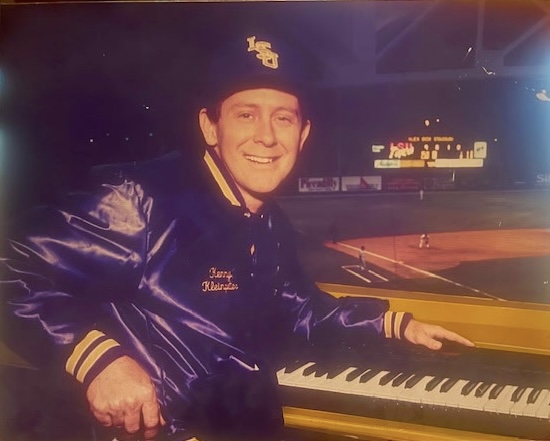“Swung on and hit to right field. That’s way back there, way back there! Home run! Tigers win! Tigers win! Warren Morris hits a two-run, home run and the Tigers are the national champs! I don’t believe it!”
With these words, LSU radio broadcaster Jim Hawthorne captured the moment the Tigers claimed the 1996 College World Series championship – the Tigers’ third national championship in six years.
Three-and-a-half seconds is all the time it took Miami Hurricanes All-American freshman closer Robbie Morrison’s breaking ball to clear the right-field fence in the most dramatic moment in College World Series history.
Never before and never since has a college championship game been decided on the final pitch. LSU junior second baseman Warren Morris hit the historic home run, bounded around the bases and touched home amid his frenzied teammates.
But not captured in Hawthorne’s broadcast is how the nine-hole hitter ended up at the plate with a runner on third base, two outs and the Tigers’ season hanging in the balance.
MORRIS’ CAREER UPS AND DOWNS
Morris arrived at LSU in 1993 as a walk-on with an academic scholarship from Alexandria.
Buried on the depth chart by All-American second baseman Todd Walker, Morris redshirted and took to soaking up as much information and as many ground balls as possible.
“That was probably the best thing that happened to me,” Morris said. “I got to get stronger, better and see what big-time college baseball is about. It also gave me some confidence that even though these guys are good, I can compete with them.”
Then-LSU coach Skip Bertman said when watching tape of Morris and Walker’s swings, coaches couldn’t tell the two apart.
“You could have put him into a shadow,” Bertman said. “What that showed me was that Warren took all kinds of advice from Todd, who he knew he would succeed.”
When the Minnesota Twins drafted Walker with the eighth overall pick of the 1994 MLB Draft, Morris took his place at second base and thrived.
Morris hit a team-leading .369 and hit eight home runs in 1995.
The following season, Morris hurt his wrist while batting against Tulane and missed 39 games after doctors struggled to diagnose the injury.
“I knew something was wrong right then,” Morris said. “I didn’t hear a pop or anything like that, but I couldn’t squeeze my hand, and it didn’t feel right.”
Doctors originally prescribed rest and time off from swinging the bat, but when the pain continued, Bertman tried to contact another doctor.
“I called them, and naturally I couldn’t get them, but I left a number,” Bertman said.
The same day, the doctor called Bertman back and diagnosed Morris’ injury as a broken hamate bone. Tasked with choosing between surgery or playing through the pain, Morris decided to have the surgery, just 16 days before the NCAA Regionals.
“Everybody is able to recover from surgery and get back to playing again at different levels,” Morris said. “I felt like if anybody could heal fast and get back in there, I could do it.”
Morris played a limited role in the days leading up to the championship game, still healing from the surgery.
“The first game I played was about 28 days after the surgery,” Morris said. “I couldn’t swing, but I was fortunate to be back as soon as I was.”
In batting practice prior to the championship matchup with Miami, Bertman remembers Morris telling him he finally felt 100 percent healthy, just in time for the season finale.
Later that day, with the Tigers trailing the Hurricanes 6-5 with two outs in the bottom of the ninth inning, Morris found himself staring down the pitcher on the biggest stage in college baseball.
“The last thing on my mind was hitting a home run,” Morris said.
Nevertheless, Morris deposited the first pitch in the right-field bleachers.
“When I turned toward second base and saw Miami’s whole infield on the ground like somebody just opened fire on them, that’s when it really registered that we just won the World Series,” Morris said.
Bertman said the path Morris took to end up at-bat with a chance to win the World Series is as remarkable as the home run itself.
“If that doctor didn’t get back to me that day, and Warren doesn’t make the decision to have surgery that day, we didn’t win that thing.” Bertman said.
MORRIS SEES SUCCESS AFTER COLLEGE
Days after his game-winning home run, Morris traveled to Millington, Tenn., to participate in the Olympic Trials.
Morris made the U.S. Olympic team – coached by Bertman – won a bronze medal in the 1996 Summer Olympics in Atlanta, Ga., and soon after signed a major league contract as the fifth round draft pick of the Texas Rangers.
The Rangers traded Morris to the Pittsburgh Pirates in 1998, who named him its opening-day starter at second base for the 1999 season.
“You have to pinch yourself that first day,” Morris said. “Now you’re fielding a ground ball and it’s Tony Gwynn that just hit it or Chipper Jones or Barry Bonds.”
Morris saw time with the Pirates, Twins and Detroit Tigers before finishing his baseball career in 2005.
The Alexandria native returned home, where he now lives with his wife, 7-year-old twin daughters and his youngest daughter who is nearly 2 years old.
Morris is now the assistant vice president and investment executive at Red River Bank in nearby Ball, La.
Morris said he can now give back to those who supported him throughout his playing career.
“People come to me with problems, needs, buying a new house or starting a new business, and I’m able to help them find a solution,” Morris said. “It’s good to be back home.”
—-
Contact Scott Branson at sbranson@lsureveille.com.
Man behind legendary ’96 home run had rollercoaster career at LSU
April 4, 2012








